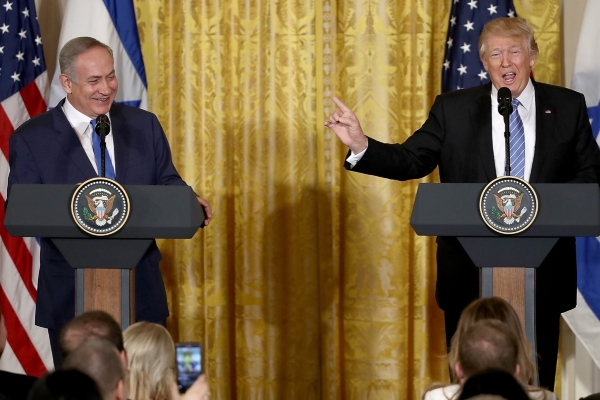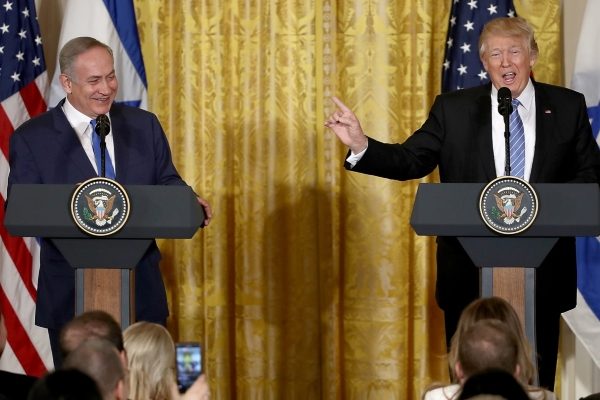

By: Robert Mathews
Source: openDemocracy
How do we assess current US policy towards Israel and its conflict with Palestine? First of all, with a personality so volatile, erratic and unpredictable, it is hazardous to make predictions. What we have seen is a mix of hard-line attitudes followed by a slight softening, followed by more hard-line proclamations during the visit with Netanyahu. Both the substance and tone of Trump’s remarks on Wednesday left some wondering whether he was just saying whatever came into his head on the Israeli problematic, or whether it represented some expert discussion and reflection on the part of the administration. Conforming to his usual public speaking style, he contradicted and backtracked and then, offering no specifics, like a salesman for cure-all potions, he cheer-led his certainty that a solution would be had – a deal would be made.
The signals are clearly mixed up to now. For some time, Trump has appeared as a tough defender of Netanyahu and his campaign against Israeli settlements in the West Bank. The US president then nominated the pro-Israeli hardliner David Friedman, as ambassador to Israel. Friedman is a fervent supporter and financial backer of Israeli settlement expansion, close to the right-wing of Likud and other extremist parties in Israel, has called Obama and his administration “blatantly anti-Semitic” and compared his progressive Jewish critics (at the pro-peace J Street in Washington, for example) to “Kapos” (Nazi collaborators). He opposes a two-state solution to the Palestinian question and both he and Trump have advocated moving the US embassy from Tel Aviv to Jerusalem. At this time that plan is not moving forward.
As a presidential candidate, Trump threatened to annul the nuclear deal with Iran signed by Obama; yet Trump’s advisers told Federica Mogherini, European Union’s top foreign policy official, that Washington would fully comply with the agreement. Then, at his press conference with Netanyahu, Trump seemed to reprise his tough line: “One of the worst deals I’ve ever seen is the Iran deal. My administration has already imposed new sanctions on Iran, and I will do more to prevent Iran from ever developing – I mean EVER – a nuclear weapon.”
In any case, it is my view that the Trump administration will not undo the Iran accord, because it would unnecessarily complicate relations with the other signatories (the United States, the United Kingdom, Russia, France, and China – plus Germany and the European Union) and would likely push Iran to restart their nuclear reactor programme in retaliation for the reimposition of economic sanctions. It is also likely that there would be resistance from the “non-fanatics” in the administration like Tillerson and Mattis (secretaries of State and Defense, respectively) against the Iranophobes like Steve Bannon, who with Flynn gone, remains the only rabid critic of the deal in Trump’s inner circle. In addition, there is an unspoken cooperation between the two countries in fighting ISIS in Iraq. The likelihood is that a low level of hostility will be maintained to check Iran’s regional ambitions which will please Israel and US ally Saudi Arabia, but that no dramatic confrontation will occur over nuclear weapons development and the “worst deal” will remain in place.
On settlements, Trump has been ambiguous. He has said settlements were not an impediment to peace, but that they “may not be helpful.” After meeting with King Abdullah II of Jordan, Trump warned Israelis that he did not believe that “going ahead with these settlements is a good thing for peace.” However, yesterday he was again tentative about his views: “As far as settlements, I’d like to see you hold back on settlements for a little bit. [my emphasis] We’ll work something out.”
The headline bombshell on Wednesday: the US would no longer insist on a Palestinian state as part of a peace accord between Israel and the Palestinians, breaking with the two-state position that the US government has maintained for three decades, and officially confirmed by George W. Bush in 2002. Trump added: “I’m looking at two states and one state…I like the one that both parties like. I can live with either one.” The illogic of granting the Israelis a relatively free hand to continue settlements and admitting the possibility of anything but a one-state solution seems to escape him.
With adolescent overconfidence, Trump brags about being a consummate dealmaker, and that he “would like to see a deal be made. I think a deal will be made…And I think we’re going to make a deal. It might be a bigger and better deal than people in this room even understand. That’s a possibility. So let’s see what we do.”
Trump seemed not to understand that the Palestinians assuredly will not accept anything less than a sovereign state, or the reality that a single Israeli state would become over a relatively short time either undemocratic or no longer Jewish. Neither Trump nor Netanyahu want to recognize that there is no peaceful solution to this seventy year conflict without full political rights and independence for both Palestinians and Israelis. A “one-state solution” could easily lead to a sharpening of the contradictions and more violence.
While opening the door to a one-state solution certainly jeopardizes Washington’s role as an “honest broker” in the Middle East, Trump’s comments pleased Netanyahu, who has never been seriously interested in pursuing a two-state solution. But it has set US policy adrift. The US is the key player in this conflict and the only nation with the diplomatic, political and financial clout to influence the course of the government. The confusing and contradictory messages along with the abandonment of the previous sine qua non of US policy – the two-state solution – contains the potential for disastrously worsening the situation between Israelis and Palestinians.
Having an orthodox Jewish son-in-law, albeit a relatively moderate personality, and investing him with at least informal diplomatic powers (he is already close to Netanyahu), is another wild card in the equation.
Netanyahu came away satisfied that Trump’s recent comments toning down his ambassador nominee’s position on settlements and his implicit support for a one-state solution will appease the Israeli right and help ease the pressure from that sector on the issue of settlements, which Netanyahu believes if pursued aggressively, would certainly complicate relations with other countries in the region, create confusion among friends and foes, and spur more radicalism and terrorism among Muslim populations locally and in Europe.
Nevertheless, Trump’s ambiguity has the potential to embolden extremists inside Israel and sharpen tensions with Arab countries. The US may pay a small price in a raised potential for a terrorist attack on US soil, but the real price will be paid in the Middle East – and by the Israelis and Palestinians in particular.
All of this leaves US policy towards Israel and Palestine quite murky. The Israeli right was ecstatic a couple of months ago with Trump’s electoral victory; now it is not so sure they have a staunch ally in Trump.
The betting is that the complex realities of this 70-year-old conflict will not be so easily dealt with by the Trump administration, but that neither will it unduly pressure the Israeli government to undertake a peace process or curtail by much the expansion of the settlements. Clearly, this US government is viewed more favorably by Israel than that of Obama, and thus has more leverage. However, the chances are Trump will either not use it or it will fail to be effective in order to move a peace process forward.
One unknown is the role of Russia which wants to involve itself more in the Israeli-Palestinian question after putting its footprint down in Syria. On the one hand, Trump is intent on resetting relations with Russia and at this point is almost bizarrely supportive of Putin. On the other hand, Russia disagrees with basic US policy towards the Israeli-Palestinian conflict: it is against removing embassies from Tel Aviv; firmly opposes settlements; supports a two–state solution; and wants a return to the “Green Line” of 1967. Whether this will have a moderating effect on Washington or produce clashes is anyone’s guess right now.



